Life

What Experts Want You To Know About Your 10-Month-Old's Sleeping Habits
Sleep is a luxury in parenthood and you know what, you expect to not get much of it in the early days. But as your child grows, you rely on the hope that, eventually, they'll sleep. And then they don't. My own daughter hit a major sleep regression around 9 months, and I found myself on the brink of tears throughout the day. I had no idea what was going on, or how to fix it. I wondered, "Is it OK that my 10-month-old isn't sleeping through the night?" Surely she was old enough to clock in some real sleep, right?
According to the American Academy of Pediatrics (AAP), a sleep regression that occurs in the interregnum between infancy and toddlerhood is very common. In their study, they concluded that a full 76 percent of the participants in the study experienced a fully-realized regression, with more than a few periods of wakefulness each night. My daughter would go from black-out tired to full-on disco party in her diaper like it's Mardi Gras and YOLO! in the blink of an eye. It was almost disturbing how fast the change happened.
While this data may make you feel better in knowing that you are by no means alone in your exhausted state, you already know that their sleep disturbances affect both you and your child negatively, and you're probably (definitely) wondering when it will stop.
According to the Sleep Center at the University of California, Los Angeles, these blips in your child's schedule are as unique as they are. While some children may need to go through an entire process to get them back to a healthy sleep schedule, other children will merely grow out of it over a period of time with less intervention.
My baby girl must've been a super special little cherub because my husband and I had to fully re-program her sleep habits. As in, we had to do the sleep training thing all over again. Instead of crying this time, she "talked." Again, she thought that bedtime was a party and didn't she just have the perfect footy pajamas for the occasion?
I asked pediatric sleep scientist Dr. Franco Fornetto of Milan why this happens and if it really is OK that a 10-month-old isn't sleeping through the night. (Side note: if I were a baby —or anyone in Milan — I'd be up all night partying, too. And by partying, I mean eating food and drinking Italian wine.)
It turns out, it's not only common, it's expected. Fornetto tells Romper via Skype, "Good sleep is a learned process that becomes second nature over time, and with any learned behavior, it adapts and changes as the rules change. While it [sleep] is also an intrinsic part of being human, a regulated schedule is more difficult. At 10 months, your baby is really learning about the world. Object permanence is a real thing — so is their ability to pull themselves to standing, or wiggle out of their night clothes. There's so much activity in their little minds that sleep becomes less interesting than anything else."
He says it's rarely cause for concern beyond how to get them back into better sleep habits, but there are a few things to look for. First is if this has been an issue since they were born, or if it's more of a regression. A baby who has never slept through the night by 10 months should be evaluated. It's not that there's anything wrong, but a pediatrician can look at your baby, and give you peace of mind.
Fornetto says that you should also look at baby's environment. "Babies who don't get enough morning light, or who aren't going to bed in a dark environment, including ridding the room of electronic blue light, are more likely to have trouble sleeping than those who do. Morning light and darkness affect your baby's melatonin production, which regulates your child's circadian cycle."
He also notes that babies who don't get enough activity or have too much activity near their bedtime will have a harder time falling asleep and staying asleep. Fornetto notes that babies need stimulation and physical activity to slough off the excesses of energy in their body, but that needs to be well in advance of bedtime, and that parents should develop a nightly wind-down routine for their infant.
The other concern Fornetto has is for children who seem to become more agitated at night, and might even be fearful about lying down. It is the case that sometimes there is a physiological reason for their sleep problems. The most common of these are apnea — which affects their respiration, reflux — which makes lying down uncomfortable, and restless legs, which I can tell you as a person who has it, makes it feel like there are a million ants in your legs and your brain is telling you to shake them off.
Fornetto says that if you notice your child becoming more agitated than usual, talk to your pediatrician just to make certain that what looks like a regression is not something more serious. Other than that, he says it's just time and patience for both parent and baby that will get you through this very normal stage of childhood. (And coffee. All the coffee.)